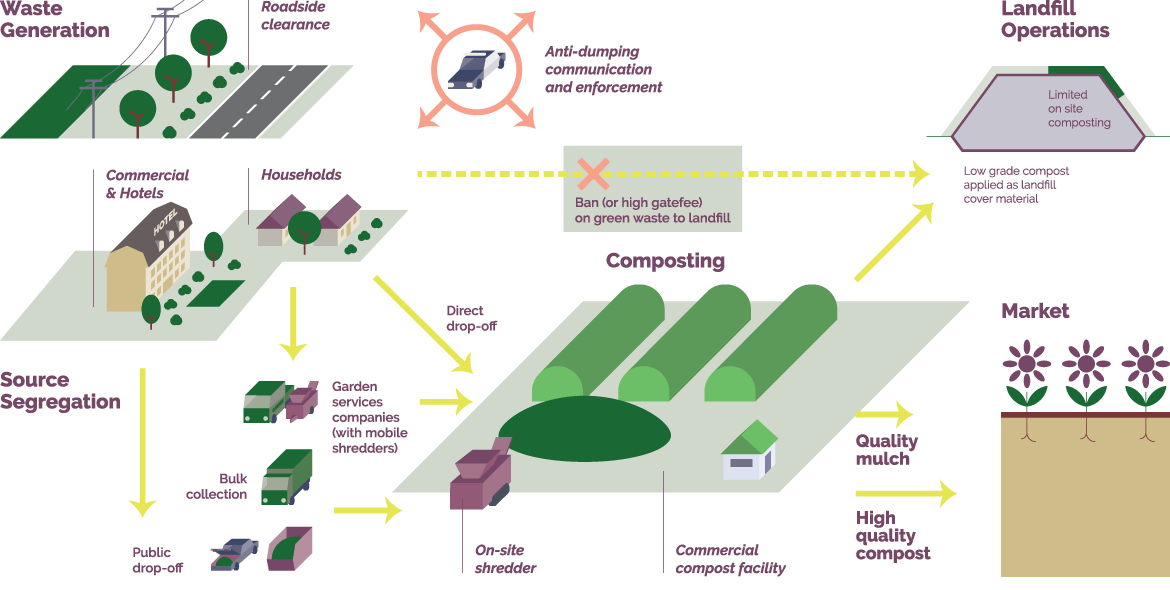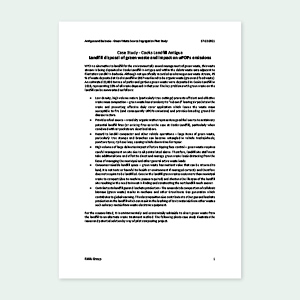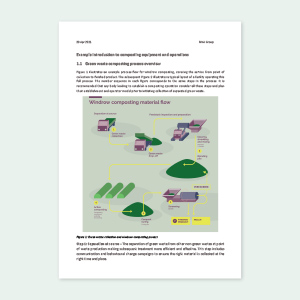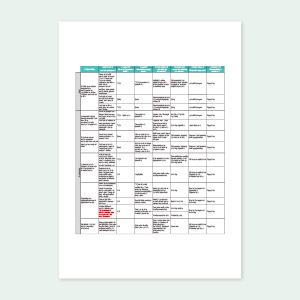
Enabling a composting service
Recovery FOGO Composting
Food Organics and Garden Organics (FOGO) in landfills produce flammable and explosive methane gas (also a very strong green-house gas), and cause challenges to landfill operations. Bulky branches in garden waste doesn’t compact well and tangle around machines resulting in oxygen levels in the waste that can sustain fires and hinders application of cover material. Organics also break down to generate leachate that leaches pollutants out of the landfill into the environment. Alternatives to landfilling, dumping and burning organics is required.
See below for a case study with photos from Cooks Landfill in Antigua, of how green waste in landfills can contribute to fires within a landfill and associated UPOPs emissions:
Case Study – Green waste at Cooks Landfill Antigua
Developing a sustainable composting system to divert the waste from landfills is key. The below guidelines provide some recommended steps for achieving this. These have been developed as part of an initiative to pilot source segregation and composting of green waste in Saint Lucia and Antigua and Barbuda as part of the effort to improve landfill operations and reduce the risk of UPOPs emissions from the sites. The following resources provide some insight into the development of these pilot projects that may assist you in developing your own.
Recommended steps to enabling sustainable green waste diversion from landfills
1. Identify the main green waste producers to be approached in the first instance.
Major producers to be targeted first include: 1) the Public Utilities departments who conduct vegetation clearance operations under power lines and water treatment locations, 2) Garden services companies that currently dispose homogenous waste loads at landfills, 3) Hotels and resorts that don’t have their own composting facility, and 4) Land developers who conduct land clearance.
2. Information, Education and Communication campaign
IEC campaigns are one of the most important aspects that require long-term sustained activities. Sensitize the target waste producer on the need and reasons to divert green waste from the landfill, the need for segregating green waste, and the plans being established to impose a ban of landfilling homogenous vehicle loads of plant materials and imposition of a gate fee for mixed loads containing plant materials mixed with other wastes going to the landfill and communicate to users to only contact licensed companies.
3. The Government should consider establishing a small grants programme or tax relief to assist entrepreneurs (particularly garden services companies) to invest in green waste shredders and equipment. Grants to be offered to companies that successfully become licensed by the regulator as green waste haulers (optional step).
Such assistance enables small garden services companies to offer a higher value of service which has wide reaching environmental, social and financial benefit to the wider society. The initial financial cost to the government for supporting these grants/tax relief must be weighed against these wider societal benefits. Small composting companies have proven to be successful small to medium sized businesses in some Small Island Developing States, see for example “Grow Antigua Compost Factory” http://growantigua.com when given the means to operate.
4. Waste Management Authorities or equivalent department should work with key stakeholders to identify potential service providers and composting facility locations, conducting pre-selection of sites that meet composting facility licensing and Environmental Impact Assessment criteria.
An interim solution is to utilize an area within existing waste management facilities / landfill areas for initial composting activities. However, in the long-term, it is important to establish clear licensing conditions for composting facilities to be able to operate and only license facilities that meet those standards. This ensures legitimate operators, that serve the wider societal benefit and invest time and finances into their operation, are not undercut and losing business to rogue companies that cut financial corners to the detriment of the environment and society.
5. Government departments should Tender and award contracts (minimum 1 year) for bush clearing / treatment services to include a condition that material is shredded on site and composted in a licensed facility.
Government and large agency procurement and contract management systems are important opportunities that enable the government to clearly specify goods and services that are beneficial to society without the need for law amendments or grants. Contracts are often awarded by the government for vegetation clearance which generate large quantities of material that currently go to a landfill site which ultimately costs society to manage. In procuring services that mandate licensed contractors and composting of cleared vegetation, this stimulates the commercial sector to invest in composting operations and divert green waste from the landfill without requiring additional regulations. Once services are established through these means, the service can be built upon by introducing landfill bans for green waste from other producers as the alternative treatment facility has been established by the service providers.
6. Assist the establishment of compost markets through government procurement of compost.
Similar to step 5, the establishment of the commercial composting facilities can be assisted without grant financing or additional regulatory control through guaranteed government procurement of compost materials to be used in applications that have wider societal benefit. This is particularly useful in the start-up phase when the operator requires to gain experience to produce good quality compost and mulch. Landfill Operators require substantial volumes of cover material at Landfills and other waste sites requiring rehabilitation. Establishing a guaranteed rate and quantity of compost procurement provides the compost operator with incentive and security to invest in producing the material. Output to be procured can include:
-
- Low grade compost (including ditch and road verge clearance with heavy metal contamination) purchased by the Landfill Operator for landfill cover (this could be mixed with shredded tyre wastes to provide a robust and resilient cover on the landfilled waste).
- Medium grade for mulch, for agriculture and plant nurseries.
- Fine grade compost for beautification projects.
7. Apply a high gate fee on green waste (that subsidizes composting operation / contract) with a higher fee for loads containing mixed green and other wates with the eventual aim to ban green waste from going to landfill.
Incrementally introduce fees and ban as government and large agency procurement systems assist the establishment of composting facility and facilities gain experience and capacity to accept more clients and materials. Ultimately, without a well enforced ban or fee for landfilling that is more than the cost of composting, the producers will default to the lowest financial cost option,which should not be dumping or landfilling.
8. Enforce ban and illegal dumping
To ensure item 7 has the required impact of stimulating composting facility use, there is a vital need to prevent illegal dumping and to heavily punish offenders to ensure green waste producers utilize the composting service.
9. Resorts and Households see garden services chipping service as cheaper than landfill gate fee / ban and engage service providers.
Once the above 8 steps have been made, the resorts and households should begin to garden chipping services as being both widely available and cheaper than sending the materials to landfill. However, this requires the waste management regulator to enforce resorts and households etc. to prove they manage their waste responsibly (i.e. by having contract with licensed garden service provider or evidence of on-site composting facility) to ensure that waste is not being illegally disposed.
Funded by
Global Environment Facility (GEF)

Implemented by
The United Nations Industrial
Development Organization (UNIDO)

Executed by
The Basel Convention Regional Centre for Training and Technology
Transfer for the Caribbean (BCRC-Caribbean)









